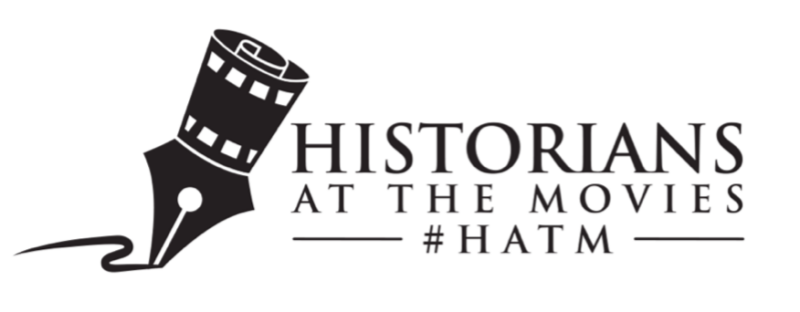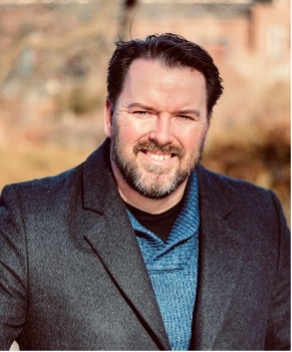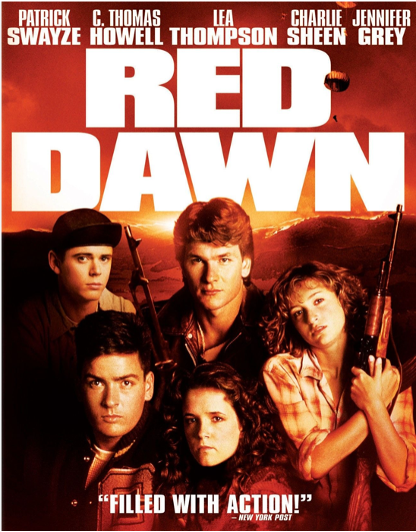 We are pleased to announce that we will conclude the 2023 S-USIH Conference in Denver on Saturday night, November 11, with a live taping of the popular podcast, Historians at the Movies (#HATM). This event will take place from 6:00-8:00 pm at the Wynkoop Brewing Company, a pleasant 15-minute walk from the Curtis Hotel. The Wynkoop menu is excellent, so we recommend making dinner out of the event. Plus, there will be drinks! #HATM founder, the historian Jason Herbert, will be in conversation with Northwestern University historian and conference keynote speaker Kathleen Belew about the classic, Cold-War themed, Colorado-based film, Red Dawn (1984). As a way to hype this event, we thought it would be fun to interview Jason. Enjoy.
We are pleased to announce that we will conclude the 2023 S-USIH Conference in Denver on Saturday night, November 11, with a live taping of the popular podcast, Historians at the Movies (#HATM). This event will take place from 6:00-8:00 pm at the Wynkoop Brewing Company, a pleasant 15-minute walk from the Curtis Hotel. The Wynkoop menu is excellent, so we recommend making dinner out of the event. Plus, there will be drinks! #HATM founder, the historian Jason Herbert, will be in conversation with Northwestern University historian and conference keynote speaker Kathleen Belew about the classic, Cold-War themed, Colorado-based film, Red Dawn (1984). As a way to hype this event, we thought it would be fun to interview Jason. Enjoy.
 Jason Herbert earned his Ph.D. in History from University of Minnesota, focusing on indigenous and environmental histories of Florida. Jason is currently a tribal liaison for the United States Forest Service in Pueblo, Colorado as well as creator of Historians At The Movies and host of the Historians At The Movies Podcast, which you can find here: https://podcasts.apple.com/us/podcast/historians-at-the-movies/id1658432453
Jason Herbert earned his Ph.D. in History from University of Minnesota, focusing on indigenous and environmental histories of Florida. Jason is currently a tribal liaison for the United States Forest Service in Pueblo, Colorado as well as creator of Historians At The Movies and host of the Historians At The Movies Podcast, which you can find here: https://podcasts.apple.com/us/podcast/historians-at-the-movies/id1658432453
This interview is conducted by Andrew Hartman, professor of history at Illinois State University and co-chair (along with Raymond Haberski, Jr) of the 2023 S-USIH Conference.
AH: Why did you become a historian? Tell us about your scholarship?
JH: So, this will sound weird. I had zero interest in becoming a historian. I famously flunked out of Murray State University twice as a kid and simply went back to school at the age of 31 to get a degree that would allow me to get a job in a post-2008 economy. But something happened at Tallahassee Community College—I just loved history. I guess in a way that made sense, since I was always the Cliff Claven-esque know it all amongst my friends. But I couldn’t imagine not being a historian and just kept going, eventually earning my Ph.D. from the University of Minnesota in 2022.
I’m from the South. I grew up in Kentucky, Louisiana, and Tennessee. I wanted to know about the people who lived on and loved those lands before me. That, along with some prodding by my undergraduate advisor Robert Owens (a fabulous human being) eventually led me to studying engagements with the land by Indigenous people and European and African newcomers to the Americas, along with the animals they brought with them.
AH: Your career trajectory is interesting. Tell us about that, and about your current position?
JH: I wrote my master’s thesis about warfare in the Native South in the years immediately before the American Revolution. And I thought when I arrived at Minnesota, I would continue that work. But a conversation with a colleague (Jimmy Sweet, another fabulous human being now at Rutgers) illustrated that I was actually more and more interested in relationships to the environment. So my dissertation and first book are about how the introduction of cattle into Florida changed societies, relationships, and the environment on the peninsula.
I felt strongly that as a scholar of both Indigenous history and the environment, I needed to physically be in Florida to write the dissertation. That eventually led to an invitation by two Seminole cattlemen, Moses Jumper, Jr. and Alex Johns, to visit and learn from them about the Tribe’s history and that of Florida. That in turn transitioned into an opportunity to serve the Tribe as an ethnographer for the better part of three years. I learned a lot about the Tribe and Florida and made some amazing friendships. I always like to say that I love three things in life: my family, Kentucky, and the Seminole Tribe of Florida. After that, I went to work for the Eastern Band of Cherokee Indians before coming aboard with the Forest Service.
Coming to the Forest Service wasn’t easy. I’m 2,000 miles from home and from my boys. But I’d grown disillusioned with academia while at the same time becoming convinced that what I wanted to do was serve Indigenous communities. I think we live in a very cynical world, but if I may, I just decided that what I wanted to do with whatever time I have on this earth is to be of service to people. Maybe here on Indigenous lands I can give back to the communities who have called Colorado home for generations. I like the idea of that at least.
AH: How are you enjoying living in Colorado thus far?
JH: I’ve been here about six or seven weeks as of this interview. I live in Pueblo, which used to be a big steel town and when the industry collapsed, the town did too. But the people here are kind. They are good. It’s salt of the earth—the kind of folks I knew growing up in Murray, Kentucky and Breaux Bridge, Louisiana. It’s hard being away from my boys and my tortoises back in Florida. But I believe in the mission and the idea of service. There’s no barbecue here, though, so I’m hoping to change that.
AH: When and why did you start Historians at the Movies? In what ways has its immense popularity been rewarding?
JH: HATM, like so many things, happened totally on accident. My friend Lisa Overholtzer, a phenomenal archaeologist up at McGill, and I always used to banter about how archaeologists got Harrison Ford as Indiana Jones but historians got Nicolas Cage as Benjamin Franklin Gates. Anyway, in 2018 I noticed National Treasure was on Netflix and suggested we all watch it together. I planned on one night. Five years later, we’re still going strong, have chapters in two other countries, and a podcast. Wild.
The rewarding part has been the community. I’ve tried to shut down HATM before. I wanted my Sundays back and after a breakup last year was in a particularly foul mood about, well, everything. But the community refused to let HATM or me, go. So many people make this community a part of their lives. I say this and mean it—I absolutely and genuinely love the members of this community.
AH: For the uninitiated, what can you tell us about HATM? What is its vibe?
JH: Basically, HATM now operates on two platforms: the Sunday night live tweet watch party and the podcast. The vibe is this: everyone is welcome. I’ll get into this below but the most important thing I want people to know is that no matter who you are, what your background is, where you’re from, anything like that, you have a place here. We want you to know that you are welcome. On Sunday nights, we watch a movie TOGETHER. That’s the power of HATM. That no matter who you are you are wanted. You are valued. So tweet along. Give us your thoughts, your memories, your snark. You are on the couch with a few thousand friends every Sunday night. That’s the vibe.
The podcast operates a bit differently. It’s usually me and another scholar or two using a film to talk about deeper issues. But it’s relaxed. I want to pull the curtain back a bit and make scholars accessible to our audiences. And we don’t need heavy films to talk about important stuff. Kathleen Belew’s first appearance on the pod was talking about Con Air! And that’s because Kathleen is brilliant but holy shit she has to talk about heavy stuff all day. Let’s break things up and talk about Nic Cage’s awful accent or the Steve Buscemi multiverse. Jeff Melnick’s episode on Once Upon a Time In Hollywood offered us the chance to talk about his book on the Manson murders but also about how he constructs courses around the history of hip hop. And Drew McKevitt’s episode on Dirty Harry allowed him to deconstruct the insanity of gun culture in the US following the release of Clint Eastwood’s rogue detective.
AH: How do you decide which films to discuss? Which historians to have on as guests?
JH: So as I was saying earlier, what I value most is making people feel welcome each week. And the best way to do that is by diversifying the films we choose. Not every film can star a straight white dude, nor can it be set in America. Straight white dudes are fine. America is great. But how do we tell stories beyond those? In a lot of ways, picking films is like probing the archives for other less-told narratives. So while we may show Lincoln, we’re also going to show The Princess and the Frog or Mulan or Milk. I also try when I can to use films as ways of talking about things relevant to the moment. So Spotlight became an important conversation when we showed it, as was last week’s showing of Sicario.
We only have one film banned from HATM: Hoosiers. Because the state of Indiana is the worst thing to ever happen.
AH: Describe your most memorable episode—or two!
JH: Let me give two examples. One is how showing these films allows us to reconceptualize what a “history movie” actually is. The best example I can give is Trading Places. On the outside it’s just a comedy. But looking back, it’s a powerful primary source. We can see Philadelphia in the early 80s, understand the racial and sexual norms of the time—there’s even a Vietnam reference early in the film. Plus is the movie an indictment of capitalism or is it an endorsement? Why was this film a hit? What are the messages here about the film and the filmgoers?
The other is Jaws. That film, along with Star Wars, changed how the world went to the movies. And my favorite part of the night was how everyone talked about their memories of seeing the film. The best nights are the nights when people talk about their personal relationships to movies, because so many of us have them.
AH: Why Red Dawn? Why Kathleen Belew (other than she is our keynote!)? Without giving anything away, what can we expect on November 11?
 JH: Red Dawn is such a powerful artifact of its time. It’s batshit crazy, written and directed by the equally batshit crazy John Milius. But Red Dawn really stokes these fantasies about average white Americans using their guns and knowledge of the terrain to defend their homelands against evil Soviets and Cubans. I don’t want to get too much into it here, but there’s so much to talk about. And it takes place in Colorado. And why Kathleen? Because she’s fucking cool. And brilliant. But mostly cool and she’s from Colorado so this movie is extra personal.
JH: Red Dawn is such a powerful artifact of its time. It’s batshit crazy, written and directed by the equally batshit crazy John Milius. But Red Dawn really stokes these fantasies about average white Americans using their guns and knowledge of the terrain to defend their homelands against evil Soviets and Cubans. I don’t want to get too much into it here, but there’s so much to talk about. And it takes place in Colorado. And why Kathleen? Because she’s fucking cool. And brilliant. But mostly cool and she’s from Colorado so this movie is extra personal.
What to expect? Come to Wynkoop Brewery. Grab a pint and get ready for a fun conversation. Kathleen and I will be trading barbs and zingers and we’ll be taking questions from the audience. We’ll have some swag for the audience. And we’re gonna have a great time.
AH: Thanks so much, we’re excited to raise a few pints with you in Denver!

0